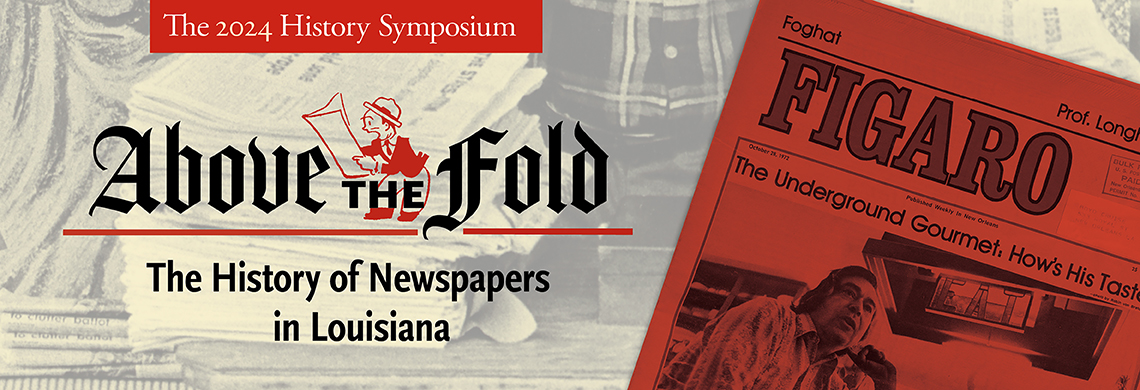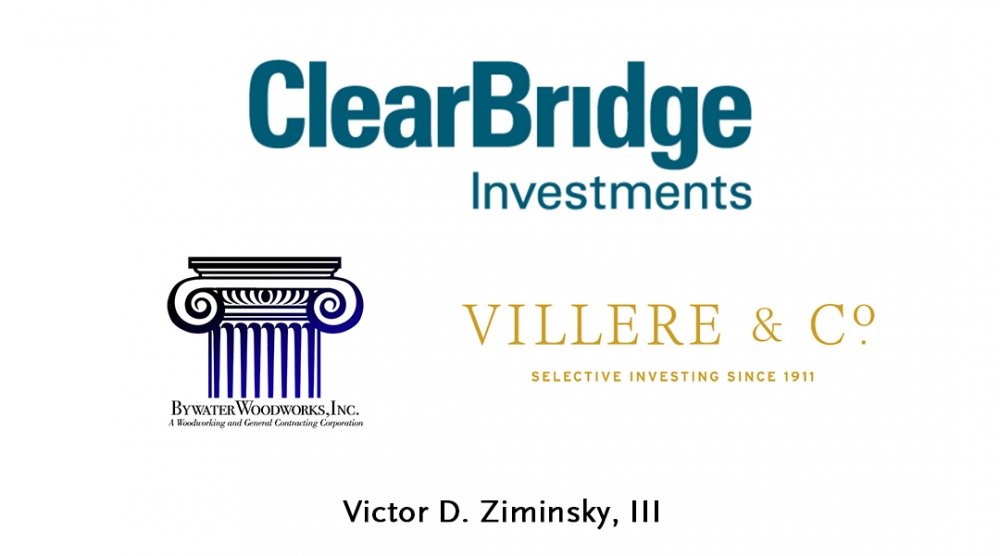2024 HISTORY SYMPOSIUM
Above the Fold: The History of Newspapers in Louisiana
Suggested price, $75; minimum, $25 (pay what you can)
Registration opens to THNOC members on Monday, January 15, at 9:30 a.m., and to the general public on Monday, January 22.
Reception immediately following the symposium is free with registration required. Register for the reception separately, here.
The complex and transformative role that newspapers have played in Louisiana is the focus of the 2024 History Symposium. A vibrant slate of speakers will explore how the medium has evolved over the last two centuries, from the decades leading up to the Civil War to the present day. In the era surrounding the war, newspapers were filled with essays promoting the opposing views and perspectives that precipitated the conflict. During this time, the state’s first Black newspapers, founded by New Orleans’s influential community of free people of color, gave rise to powerful voices from the foundational era of the civil rights struggle. Following the war, newspapers began to cover a broader range of topics and their influence expanded. This era saw the advent of crime coverage and editorial cartoons. The counterculture tide of the 1960s gave rise to alternative newsweeklies like Figaro, which infused the New Orleans journalism landscape with inventive and occasionally audacious arts and culture coverage. Natural and manmade disasters and the rise of digital media in the 21st century have posed new challenges for the industry. Above the Fold will reach beyond these historical narratives to explore how newspapers have not only reported on but also actively shaped the Louisiana experience.
SCHEDULE OF EVENTS
- 9 a.m.
Registration
- 9:45 a.m.
Welcome
Daniel Hammer, President and CEO, The Historic New Orleans Collection
Terry Baquet, moderator, Editor-in-Chief, Verite News - 10 a.m.
The History of Black Newspapers
Dr. Shearon Roberts, Associate Professor of Mass Communication, Xavier University of Louisiana
Dr. Roberts traces how early print culture in New Orleans left a historical record of an emerging colonial space that was redefining racial, social, and political constructs ahead of its time. Spurred by migration from St. Domingue, the historical Black press in New Orleans laid the foundation for revolutionary changes to come in the South.
10:45 a.m.Break
- 11 a.m.
Keynote Address: United for Justice: The Voices of L’Union and the New Orleans Tribune
Mark Charles Roudané, independent scholar and descendant of Dr. Roudanez, in conversation with Jari Honora, Family Historian, The Historic New Orleans Collection
Few know about a powerful Black freedom movement that began in New Orleans during the Civil War and Reconstruction eras. Two newspapers sparked a campaign for racial justice in the Crescent City that extended far beyond Louisiana’s borders. This moving saga is chronicled in the pages of L’Union, the South’s first Black newspaper, and its successor, the New Orleans Tribune, America’s first Black daily. In conversation with Honora, Roudané will discuss the history of these journals. The talk will foreground the eloquent and powerful voices captured in the newspapers by featuring key extracts.
- 11:45 a.m.
Opera Performance: Les Lions de la Reconstruction
Featuring OperaCréole
OperaCréole, a New Orleans opera company dedicated to performing lost or rarely performed works by composers of African descent, will perform a scene from its one-act opera, Les Lions de la reconstruction, which showcases the Reconstruction-era civil rights struggle in New Orleans.
- 12 p.m.
Lunch (on your own)
- 1 p.m.
The Great Digby Kidnapping Case and the New Orleans Press during the Reconstruction Era
Dr. Michael Ross, Professor of History, University of Maryland
In June 1870, a sensational kidnapping case in New Orleans captured the attention of the city and much of the nation. In this session, Dr. Ross explains how newspaper coverage of the Digby Case quickly became intertwined with the ferocious politics of the Reconstruction era and reflected the partisan journalistic practices of the time.
- 1:45 p.m.
I’ll See New Orleans in the Funny Papers
Michael Tisserand, author of a biography of cartoonist George Herriman, the New Orleans native who created the Krazy Kat comic strip
Tisserand will provide an illustrated journey through a century and a half of comics and cartoons from and about New Orleans.
- 2:15 p.m.
Figaro in New Orleans
Alison Fensterstock, writer and editor, in conversation with Jack Davis, cofounder of Figaro
The alt-weekly Figaro, published in New Orleans from the early 1970s until 1981, set the tone for alternative media in New Orleans and was the first professional outlet for writers and artists like Bunny Matthews, Jon Newlin, Jeff Hannusch, and others. Fensterstock and Davis will discuss Figaro’s legacy, with an eye to the history of arts-and-culture writing in the local press.
- 2:45 p.m.
Break
- 3 p.m.
Media Lessons from Natural Disasters
Dr. Andrea Miller and Dr. Shearon Roberts, editors of Oil and Water: Media Lessons from Hurricane Katrina and the Deepwater Horizon Disaster, in conversation with David Hammer, investigative reporter
Hurricane Katrina (2005) and the BP oil spill (2010) were two very different disasters that hit Louisiana five short years apart. Dr. Miller and Dr. Roberts will compare and contrast how local and national media reported on the disasters and discuss the lessons learned. Hammer will add his perspective from covering the BP oil spill for the Times-Picayune, tracing his investigation into what caused the deadly disaster, the lack of safety and environmental oversight, and the effort to hold those responsible accountable.
- 4 p.m.
The Transformation of American Newspapers
Dr. Vicki Mayer, Professor of Communication, Tulane University, in conversation with Gordon Russell, Managing Editor/Investigations, the Times-Picayune / New Orleans Advocate
The formation of the NOLA Media Group in 2012 was the harbinger for a new-media news economy in New Orleans—one that was based on clicks and scrolls, over subscribers and circulars. Dr. Mayer and Russell will address how New Orleans followed and then bucked national trends in the digital news industry. While New Orleans is still a newspaper town, the precarious state of print, and the publishing industry in general, requires us to not be complacent about the value of news over information.
- 4:45 p.m.
Closing Remarks
Moderator Terry Baquet reflects on today’s digital news landscape
- 5 p.m.
Reception Celebrating the Homecoming of the Roudanez Papers
Featuring performances by OperaCréole
520 Royal Street
Free with reservation required
The symposium reception celebrates the homecoming of the papers of Dr. Louis Charles Roudanez (1823–1890), the Creole physician and newspaperman who cofounded the South’s first Black newspaper, L’Union, in New Orleans in 1862. THNOC recently acquired Roudanez’s collection of essays and family papers and brought them home to Louisiana. These significant documents provide firsthand testimony of the early struggle for African American civil rights in the state, and they are now available to the local community at THNOC.
Previous Symposia: Learn more about the topics explored at prior History Symposiums (previously named the Williams Research Center Symposium).
SPEAKERS
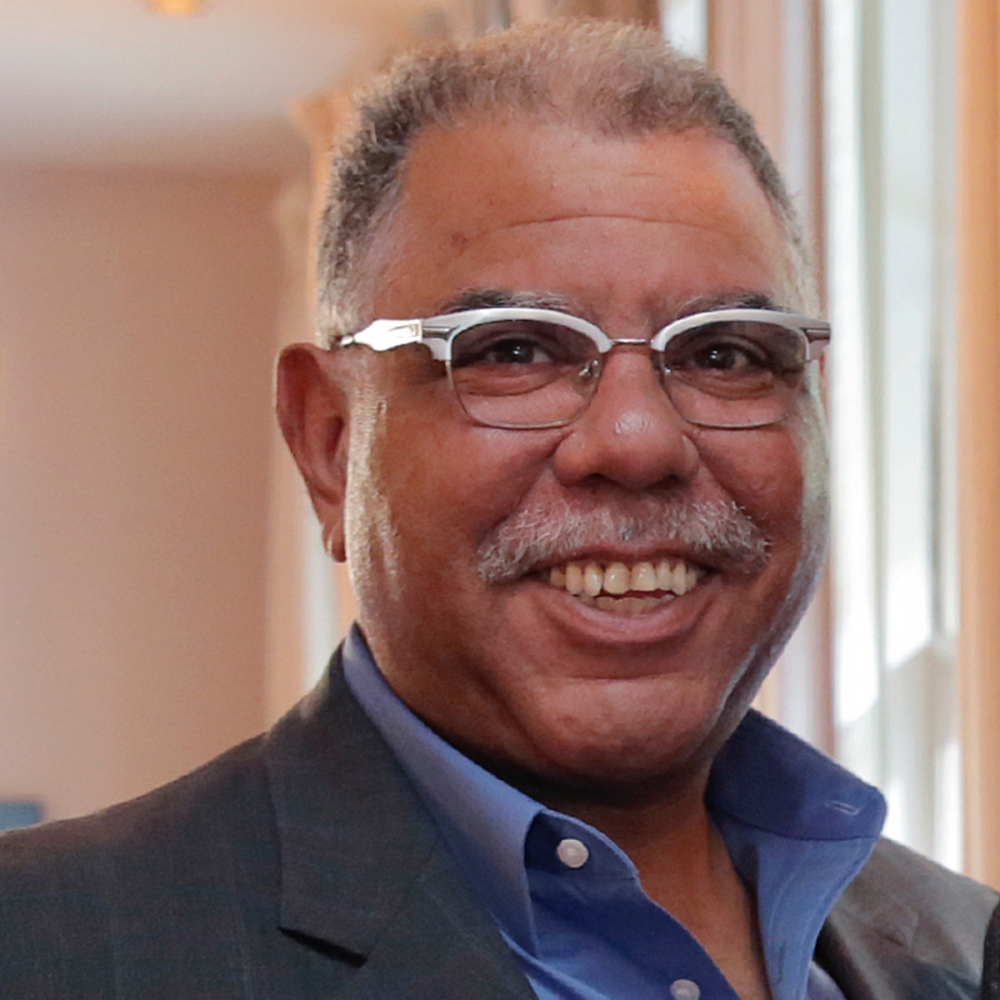 Terry Baquet (moderator) is editor-in-chief of Verite News in New Orleans. He is a twenty-eight-year veteran of NOLA.com | The Times-Picayune and a lifelong New Orleanian. He served as Sunday editor and was the page 1 editor during the paper’s Katrina coverage, which won two Pulitzer Prizes, in breaking news and public service. In 2012 Baquet was named managing editor / director of print, a role in which he essentially oversees all editorial decisions for the newspaper’s print edition. He has served on the boards of Lede New Orleans and Spaceship Media. Baquet has served as a Pulitzer Prize juror twice, and he chaired the jury that decided the 2019 Pulitzer Prize for local reporting.
Terry Baquet (moderator) is editor-in-chief of Verite News in New Orleans. He is a twenty-eight-year veteran of NOLA.com | The Times-Picayune and a lifelong New Orleanian. He served as Sunday editor and was the page 1 editor during the paper’s Katrina coverage, which won two Pulitzer Prizes, in breaking news and public service. In 2012 Baquet was named managing editor / director of print, a role in which he essentially oversees all editorial decisions for the newspaper’s print edition. He has served on the boards of Lede New Orleans and Spaceship Media. Baquet has served as a Pulitzer Prize juror twice, and he chaired the jury that decided the 2019 Pulitzer Prize for local reporting.
 Dr. Shearon Roberts is associate professor of mass communication and faculty member in African American and diaspora studies at Xavier University in New Orleans. She is the director of the honors program Xavier Exponential. She earned a PhD in Latin American studies from Tulane University’s Roger Thayer Stone Center for Latin American Studies. Her forthcoming book Media Discourse in Haiti examines the last decade in Haiti through the lens of Haiti’s media as the country recovered from the 2010 earthquake. She is co-editor of HBO’s Treme and Post-Katrina Catharsis: The Mediated Rebirth of New Orleans (Lexington, 2017) and co-author of Oil and Water: Media Lessons from Hurricane Katrina and the Deepwater Horizon Disaster (University Press of Mississippi, 2014). She studies the impact of digital media and social movements and is the editor of the 2020 book Recasting the Disney Princess in an Era of New Media and Social Movements (Rowman & Littlefield). She has worked as a reporter covering Latin America and the Caribbean, and she holds an MMC from Louisiana State University and a BA in mass communication with a double minor in Spanish and French from Dillard University.
Dr. Shearon Roberts is associate professor of mass communication and faculty member in African American and diaspora studies at Xavier University in New Orleans. She is the director of the honors program Xavier Exponential. She earned a PhD in Latin American studies from Tulane University’s Roger Thayer Stone Center for Latin American Studies. Her forthcoming book Media Discourse in Haiti examines the last decade in Haiti through the lens of Haiti’s media as the country recovered from the 2010 earthquake. She is co-editor of HBO’s Treme and Post-Katrina Catharsis: The Mediated Rebirth of New Orleans (Lexington, 2017) and co-author of Oil and Water: Media Lessons from Hurricane Katrina and the Deepwater Horizon Disaster (University Press of Mississippi, 2014). She studies the impact of digital media and social movements and is the editor of the 2020 book Recasting the Disney Princess in an Era of New Media and Social Movements (Rowman & Littlefield). She has worked as a reporter covering Latin America and the Caribbean, and she holds an MMC from Louisiana State University and a BA in mass communication with a double minor in Spanish and French from Dillard University.
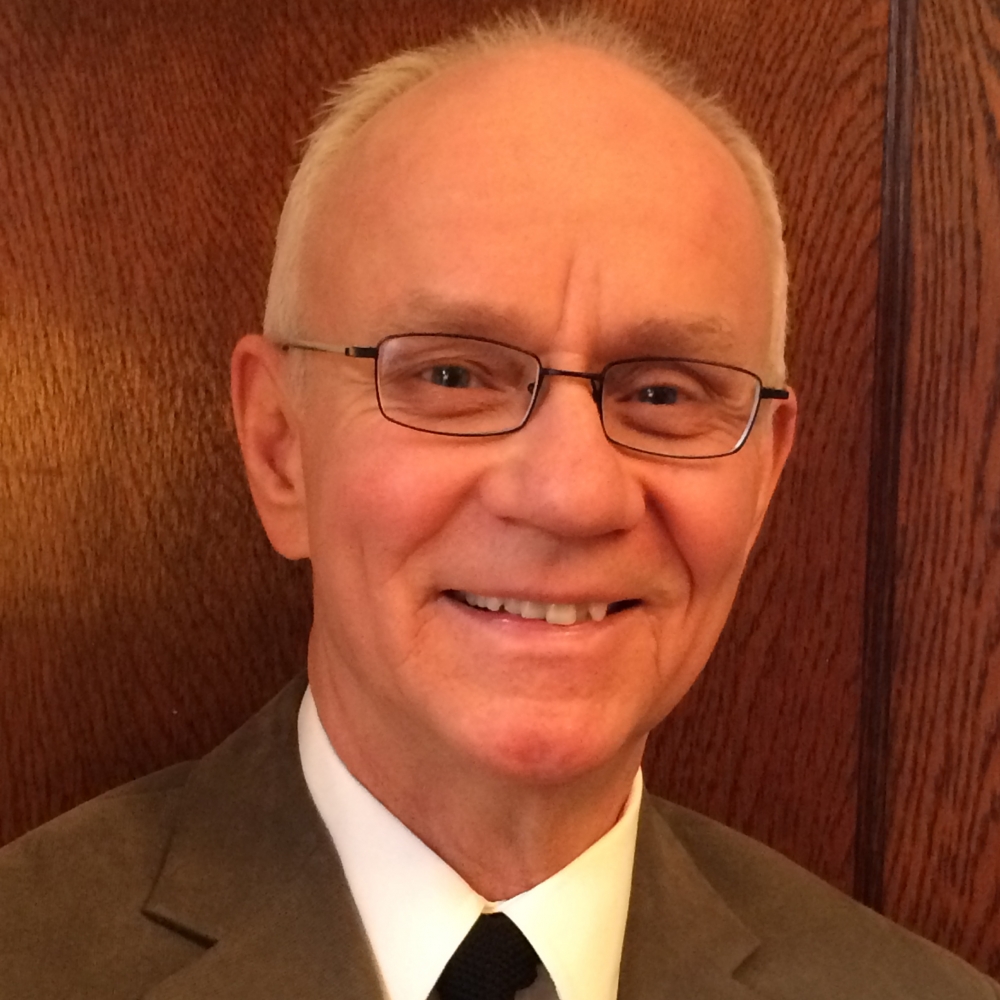 Mark Charles Roudané was born in New Orleans in 1951. He is the great-great-grandson of Dr. Louis Charles Roudanez, founder of the South’s first Black newspaper, L’Union, and the New Orleans Tribune, America’s first Black daily. Inspired by his heritage, Roudané has spent the last decade passionately researching these groundbreaking journals and bringing this inspirational and underrepresented history to the general public. His book, The New Orleans Tribune: An Introduction to America’s First Black Daily Newspaper (2018), has reached a wide audience. Roudané’s articles have appeared in numerous journals, including The Atlantic, and 64 Parishes. Mark has presented on L’Union and the Tribune at universities, museums, and cultural organizations throughout the United States. Follow his work at www.facebook.com/roudanezhistory and www.roudanez.com.
Mark Charles Roudané was born in New Orleans in 1951. He is the great-great-grandson of Dr. Louis Charles Roudanez, founder of the South’s first Black newspaper, L’Union, and the New Orleans Tribune, America’s first Black daily. Inspired by his heritage, Roudané has spent the last decade passionately researching these groundbreaking journals and bringing this inspirational and underrepresented history to the general public. His book, The New Orleans Tribune: An Introduction to America’s First Black Daily Newspaper (2018), has reached a wide audience. Roudané’s articles have appeared in numerous journals, including The Atlantic, and 64 Parishes. Mark has presented on L’Union and the Tribune at universities, museums, and cultural organizations throughout the United States. Follow his work at www.facebook.com/roudanezhistory and www.roudanez.com.
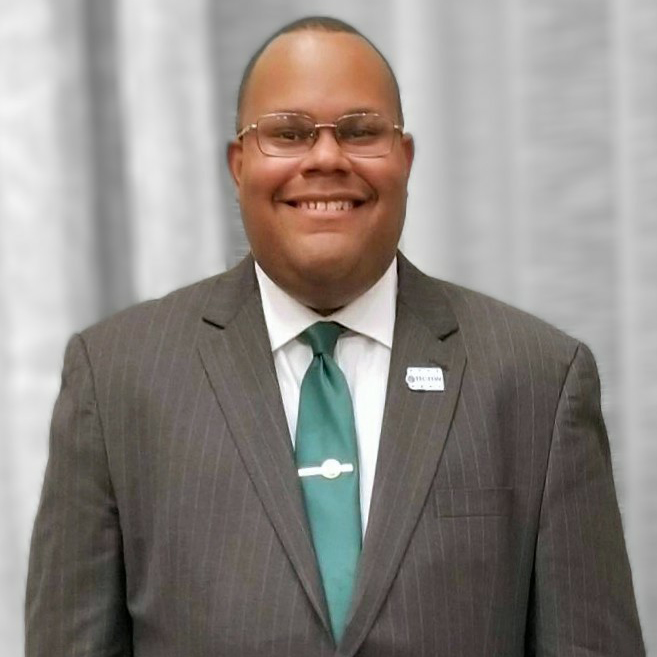 Jari C. Honora is a New Orleans native and proud Louisiana Creole with roots dating back more than two centuries along Bayou Lafourche and the German-Acadian Coast. He is a graduate of St. Augustine High School and Tulane University. He serves as family historian in the Williams Research Center at The Historic New Orleans Collection. He previously worked for Le Musée de f.p.c. and taught in the area’s charter schools. He is also a certified genealogist and has done research for the television program Finding Your Roots and the Georgetown Memory Project. As one of four contributors to the CreoleGen blog, he regularly shares his research findings on Louisiana Creole people and institutions.
Jari C. Honora is a New Orleans native and proud Louisiana Creole with roots dating back more than two centuries along Bayou Lafourche and the German-Acadian Coast. He is a graduate of St. Augustine High School and Tulane University. He serves as family historian in the Williams Research Center at The Historic New Orleans Collection. He previously worked for Le Musée de f.p.c. and taught in the area’s charter schools. He is also a certified genealogist and has done research for the television program Finding Your Roots and the Georgetown Memory Project. As one of four contributors to the CreoleGen blog, he regularly shares his research findings on Louisiana Creole people and institutions.
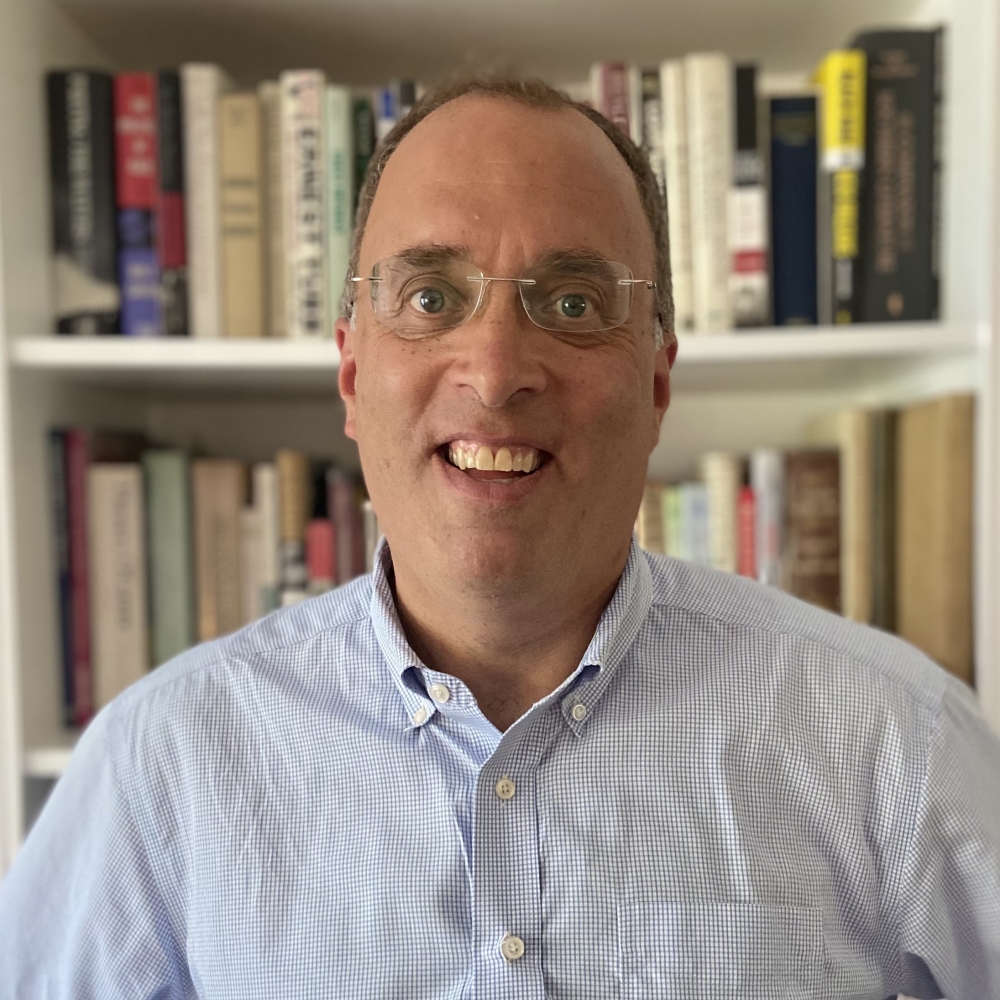 Dr. Michael Ross is a professor of history at the University of Maryland at College Park, where he specializes in the Civil War and Reconstruction eras. He is the author of numerous prize-winning articles and two prize-winning books: Justice of Shattered Dreams: Samuel Freeman Miller and the Supreme Court during the Civil War Era (LSU Press, 2003) and The Great New Orleans Kidnapping Case: Race, Law, and Justice in the Reconstruction Era (Oxford University Press, 2015). The Great New Orleans Kidnapping Case received favorable reviews in the New York Times, Wall Street Journal, and other periodicals; was a selection of the History Book Club; and won The Historic New Orleans Collection’s Kemper and Leila Williams Prize in Louisiana History and the Library Choice Award for Non-Fiction by the New Orleans Public Library Foundation. He serves as associate editor of the Journal of Supreme Court History, has served as the historical advisor to the United States Mint, and has twice delivered talks in the Leon Silverman Lecture Series at the United States Supreme Court. He holds a JD from the Duke University School of Law and earned a PhD in history at the University of North Carolina at Chapel Hill.
Dr. Michael Ross is a professor of history at the University of Maryland at College Park, where he specializes in the Civil War and Reconstruction eras. He is the author of numerous prize-winning articles and two prize-winning books: Justice of Shattered Dreams: Samuel Freeman Miller and the Supreme Court during the Civil War Era (LSU Press, 2003) and The Great New Orleans Kidnapping Case: Race, Law, and Justice in the Reconstruction Era (Oxford University Press, 2015). The Great New Orleans Kidnapping Case received favorable reviews in the New York Times, Wall Street Journal, and other periodicals; was a selection of the History Book Club; and won The Historic New Orleans Collection’s Kemper and Leila Williams Prize in Louisiana History and the Library Choice Award for Non-Fiction by the New Orleans Public Library Foundation. He serves as associate editor of the Journal of Supreme Court History, has served as the historical advisor to the United States Mint, and has twice delivered talks in the Leon Silverman Lecture Series at the United States Supreme Court. He holds a JD from the Duke University School of Law and earned a PhD in history at the University of North Carolina at Chapel Hill.
 Michael Tisserand is former editor of Gambit newspaper and is the author of Krazy: George Herriman, a Life in Black and White (HarperCollins, 2018), the Eisner Award–winning biography of New Orleans native George Herriman, creator of the comic strip Krazy Kat. Tisserand’s other books include the ASCAP Deems Taylor Award–winning The Kingdom of Zydeco (Arcade, 1998); the Hurricane Katrina memoir Sugarcane Academy: How a New Orleans Teacher and His Storm-Struck Students Created a School to Remember (Harper, 2007); and My Father When Young (Sager Group, 2021), a collection of 1950s-era photography by his father, Jerry Tisserand. Tisserand’s work has also appeared in the New York Times, the Oxford American, the Nation, Daily Beast, and Lit Hub. He is currently working on books about Bunny Matthews (forthcoming from The Historic New Orleans Collection) and Charlie Chaplin.
Michael Tisserand is former editor of Gambit newspaper and is the author of Krazy: George Herriman, a Life in Black and White (HarperCollins, 2018), the Eisner Award–winning biography of New Orleans native George Herriman, creator of the comic strip Krazy Kat. Tisserand’s other books include the ASCAP Deems Taylor Award–winning The Kingdom of Zydeco (Arcade, 1998); the Hurricane Katrina memoir Sugarcane Academy: How a New Orleans Teacher and His Storm-Struck Students Created a School to Remember (Harper, 2007); and My Father When Young (Sager Group, 2021), a collection of 1950s-era photography by his father, Jerry Tisserand. Tisserand’s work has also appeared in the New York Times, the Oxford American, the Nation, Daily Beast, and Lit Hub. He is currently working on books about Bunny Matthews (forthcoming from The Historic New Orleans Collection) and Charlie Chaplin.
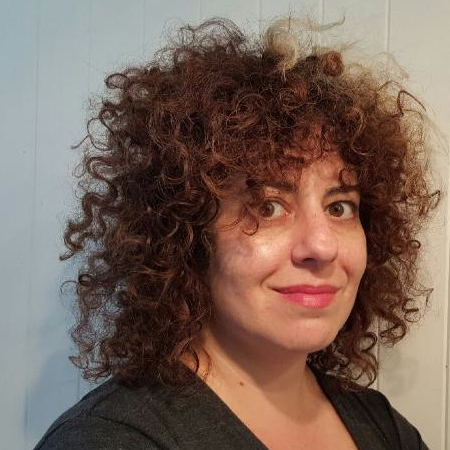 Alison Fensterstock has worked as a music critic for the alt-weekly Gambit and the daily Times-Picayune. Along with Michael Tisserand, she is the coauthor of The Historic New Orleans Collection’s forthcoming biography of cartoonist Bunny Matthews. She is also the editor of NPR Music’s collection Turning the Tables: How Women Made Popular Music (NPR, 2024).
Alison Fensterstock has worked as a music critic for the alt-weekly Gambit and the daily Times-Picayune. Along with Michael Tisserand, she is the coauthor of The Historic New Orleans Collection’s forthcoming biography of cartoonist Bunny Matthews. She is also the editor of NPR Music’s collection Turning the Tables: How Women Made Popular Music (NPR, 2024).

Dr. Andrea Miller is professor and dean in the Mayborn School of Journalism at the University of North Texas. Prior to that, she served as associate dean for undergraduate studies in LSU’s Manship School of Mass Communication. Miller received her doctorate from the University of Missouri–Columbia School of Journalism and was an award-winning television news producer for a decade. Miller has published articles on television news and crisis coverage in Journalism & Mass Communication Quarterly, Media Psychology, Visual Communication Quarterly, and the Journal of Contingencies and Crisis Management. Additionally, Miller has three books with co-authors and co-editors: Oil and Water: Media Lessons from Hurricane Katrina and the Deepwater Horizon Disaster (University Press of Mississippi, 2014), News Evolution or Revolution? The Future of Print Journalism in the Digital Age (Peter Lang, 2014), and Public Relations and Journalism in Times of Crisis, A Symbiotic Partnership (Peter Lang, 2019).
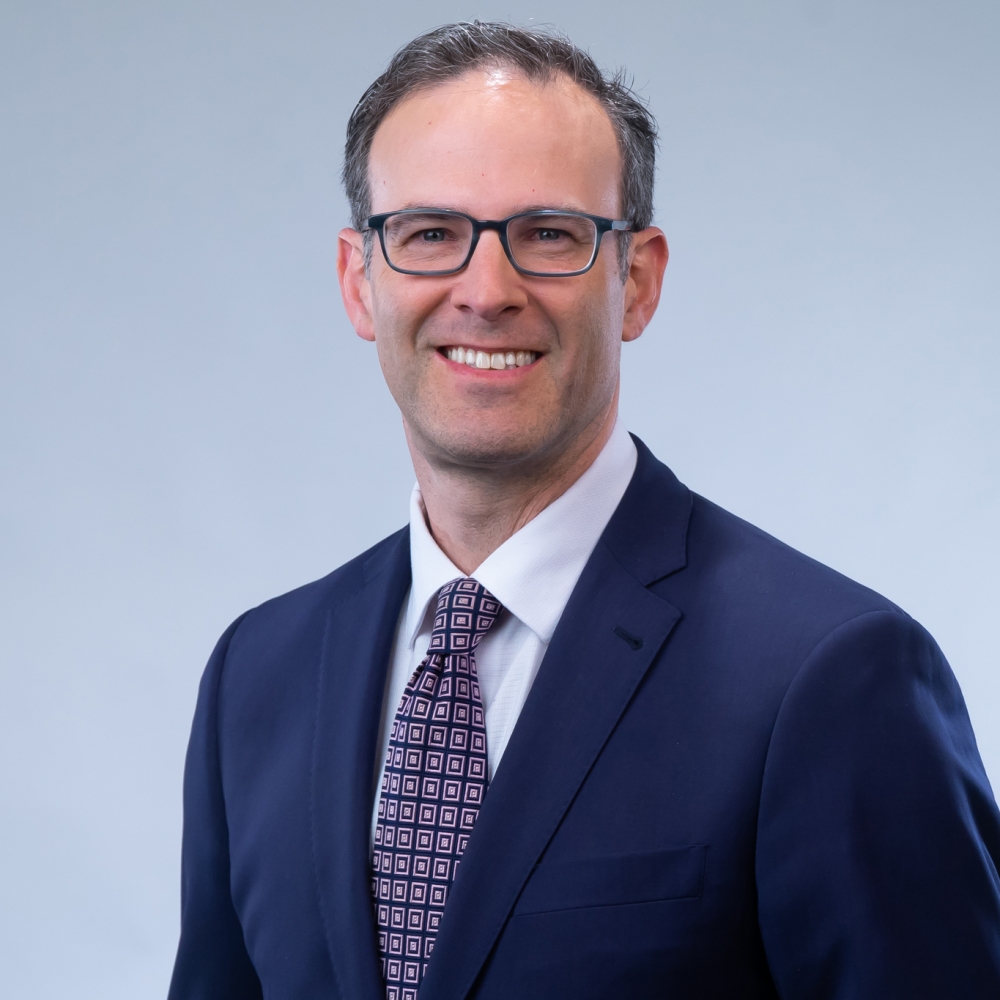 David Hammer is an award-winning investigative reporter at WWL Louisiana with more than twenty-six years of experience as a TV, print, and wire-service reporter. Hammer has won five regional Emmy Awards for his television investigations, including two environmental news Emmys. He also won national awards from the Society of Environmental Journalists and from the Scripps Howard Foundation for his investigation of what caused the BP oil spill in 2010. As a seventh-generation New Orleanian, Hammer is proud to expose the governmental corruption, environmental pollution, and other abuses of power that damage our local communities.
David Hammer is an award-winning investigative reporter at WWL Louisiana with more than twenty-six years of experience as a TV, print, and wire-service reporter. Hammer has won five regional Emmy Awards for his television investigations, including two environmental news Emmys. He also won national awards from the Society of Environmental Journalists and from the Scripps Howard Foundation for his investigation of what caused the BP oil spill in 2010. As a seventh-generation New Orleanian, Hammer is proud to expose the governmental corruption, environmental pollution, and other abuses of power that damage our local communities.
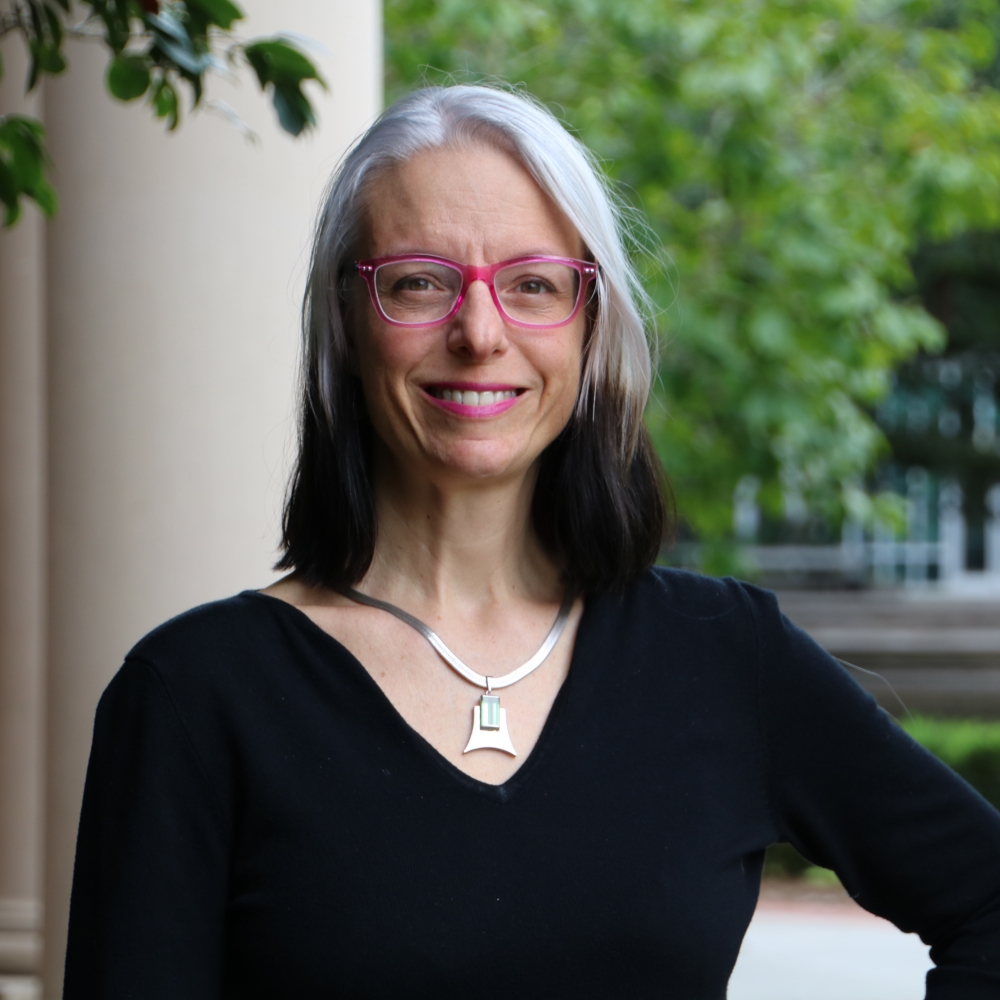 Dr. Vicki Mayer is professor of communication at Tulane University. Her research encompasses media and communication industries and their political economies, infrastructures, and organizational work cultures. Her critiques of mass media informs her own work in digital innovation and publishing, most recently on ViaNolaVie and New Orleans Historical. In 2021, she won the Professional Freedom and Responsibility Award from the Association for Education in Journalism and Mass Communication.
Dr. Vicki Mayer is professor of communication at Tulane University. Her research encompasses media and communication industries and their political economies, infrastructures, and organizational work cultures. Her critiques of mass media informs her own work in digital innovation and publishing, most recently on ViaNolaVie and New Orleans Historical. In 2021, she won the Professional Freedom and Responsibility Award from the Association for Education in Journalism and Mass Communication.
 Gordon Russell has been reporting in southeast Louisiana since 1999. The stories he has covered include Hurricane Katrina and its grim aftermath; the downfall of former mayor Ray Nagin; the brazen self-dealing in Louisiana’s prison system; and the online-commenting scandal at the U.S. Attorney’s Office. He was part of the team that produced “Tilting the Scales,” which won the Pulitzer Prize for local reporting in 2019. Before moving to Louisiana, he worked as a reporter at the Herald-Tribune in Sarasota, Florida, and at the Dominion Post in Morgantown, West Virginia.
Gordon Russell has been reporting in southeast Louisiana since 1999. The stories he has covered include Hurricane Katrina and its grim aftermath; the downfall of former mayor Ray Nagin; the brazen self-dealing in Louisiana’s prison system; and the online-commenting scandal at the U.S. Attorney’s Office. He was part of the team that produced “Tilting the Scales,” which won the Pulitzer Prize for local reporting in 2019. Before moving to Louisiana, he worked as a reporter at the Herald-Tribune in Sarasota, Florida, and at the Dominion Post in Morgantown, West Virginia.
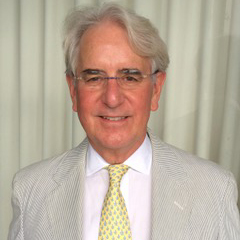 Jack Davis was a reporter, columnist, and editor for three New Orleans newspapers—Figaro, the States-Item, and the Times-Picayune. In 1983, he became metro editor at the Chicago Tribune and then editor-in-chief of Tribune Company’s newspaper in Virginia, moved back to Chicago as president of Tribune Interactive in 1998, and then moved to Connecticut as editor and president of Hartford Courant, America’s oldest newspaper, when it was purchased by Tribune. He became vice president of Chicago Metropolis 2020, a non-profit planning group and joined the boards of the National Trust for Historic Preservation and the Congress for the New Urbanism. Living now in New Orleans, where his wife and son are natives, he is chair of the executive council of WWNO radio and served as acting executive director of the Preservation Resource Center. He is a graduate of Harvard College, attended the University of Rajasthan in India in 1971, and was a professional journalism fellow at Stanford.
Jack Davis was a reporter, columnist, and editor for three New Orleans newspapers—Figaro, the States-Item, and the Times-Picayune. In 1983, he became metro editor at the Chicago Tribune and then editor-in-chief of Tribune Company’s newspaper in Virginia, moved back to Chicago as president of Tribune Interactive in 1998, and then moved to Connecticut as editor and president of Hartford Courant, America’s oldest newspaper, when it was purchased by Tribune. He became vice president of Chicago Metropolis 2020, a non-profit planning group and joined the boards of the National Trust for Historic Preservation and the Congress for the New Urbanism. Living now in New Orleans, where his wife and son are natives, he is chair of the executive council of WWNO radio and served as acting executive director of the Preservation Resource Center. He is a graduate of Harvard College, attended the University of Rajasthan in India in 1971, and was a professional journalism fellow at Stanford.

